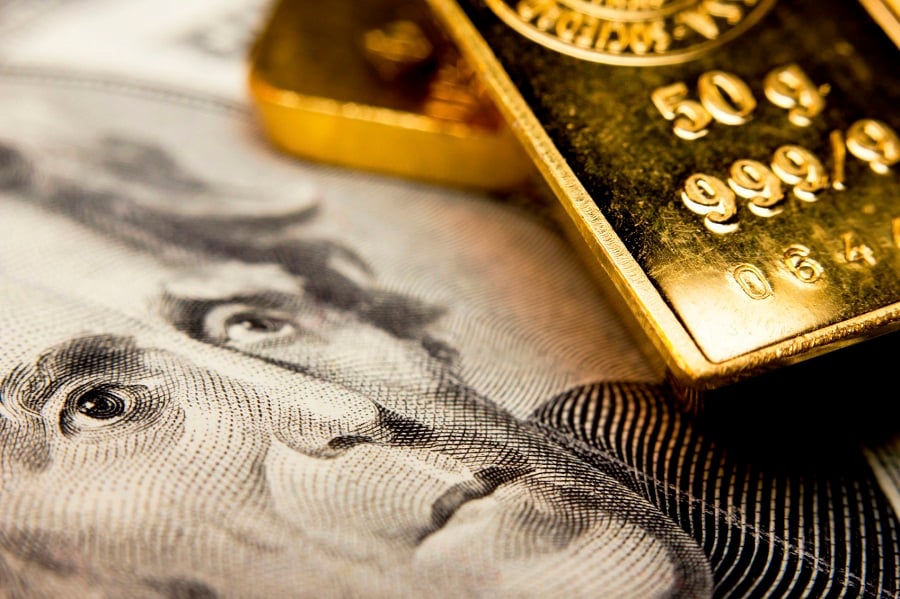

As fears of an economic slowdown and a recession continue to climb, including new signs that the Federal Reserve is on track to cut interest rates later this year, financial advisers are revisiting the pros and cons of turning to gold as a market hedge. "Gold is a store of absolute value, and when rates are going down and the economy is slowing, gold is real good diversifier," said Dennis Nolte, vice president at Seacoast Investment Services, where he is currently allocating between 5% and 7% of client portfolios to the precious metal. Mr. Nolte, who gains exposure to gold through SPDR Gold Shares ETF (GLD), also likes the fact that gold is inversely correlated to the U.S. dollar, which has been falling in stride with the increasing odds that the Fed will cut rates by its meeting in September. "As long as the market is saying rates will keep falling, then gold will be an even better store of value," he said. "And if all hell breaks loose, then gold will absolutely be the place to hang out." While most market watchers are not yet calling for anything along the lines of all hell breaking loose, legendary straight talker and fixed-income manager Jeffrey Gundlach of DoubleLine Funds did give a nod toward gold during an investor webcast last week when he described 2019 as the opposite of 2018. "I'm certainly long gold," he said, according to Kitco.com, which also reported that Mr. Gundlach predicted a 40% to 45% chance of a recession within the next six months and a 65% chance within 12 months. Immediately following Wednesday's announcement from the Fed, whose wording suggested an easing move will occur later this year, Mr. Gundlach doubled down on his prediction of a looming recession. "The bond market knows the Fed is capitulating today, and the only reason the Fed didn't cut today is because it's too embarrassing for them after being so hawkish a year ago," Mr. Gundlach said. "The Fed is now predicted to have a 100% chance of cutting rates in July." Heading into this week's Fed meeting, the bond market had registered an 86% chance of a rate cut at the September meeting. "I think the Fed will cut 50 basis points by September, and the only thing that would stop that is stronger economic data," Mr. Gundlach said. But he cautioned against falling into the trap of assuming that a Fed rate cut will help the economy to avoid a recession. "A rate cut would increase the probability of recession," Mr. Gundlach said. "There's no historical evidence that a rate cut stops a recession, it's actually an acknowledgement that things will get worse because the Fed is behind the curve." As is usually the case, aggressive calls for gold investing also brings out criticism of gold as an investment strategy. "There are so many misconceptions about gold; it's not a good hedge against inflation as many argue," said Paul Schatz, president of Heritage Capital. "It can sometimes preserve value during recessions as interest rates go down and people seek other investments, but bonds are much better investments during recessions," Mr. Schatz said. "Huge secular moves in gold are usually associated with a loss of confidence somewhere." In 2008, for example, the price of gold experienced a 30% drop, then bounced back to almost triple in value. "Gold did very little during the 2001 recession, but soared over the following six years," Mr. Schatz said. "And gold declined during the 1990 recession." So far this year, GLD as a proxy for the price of the commodity is up 4.84% following a 1.94% decline last year. The S&P 500 Index, by comparison, is up 16.39% this year and declined by 6.24% last year. While some advisers will shy away from gold as a rule, regardless of the market cycle, others view it as a permanent piece of a diversified portfolio. "While the role of gold as a currency is ubiquitous around the world, knowing when or how much to hold in your portfolio can be a tricky game," said Jon Ulin, managing principal at Ulin & Co. Wealth Management. "We recommend to clients to hold a small portion of gold and commodities, about 5%, in their balanced portfolios as a market hedge," Mr. Ulin said. "The addition of gold as a fear hedge may not pay off anytime in the near future. He said that although many are betting that the bull market, having lasted more than 10 years, is coming to an end, "we remind our clients that bull markets do not die because of old age, they die because of behaviors such as overspending and overleverage."

Relationships are key to our business but advisors are often slow to engage in specific activities designed to foster them.

Whichever path you go down, act now while you're still in control.

Pro-bitcoin professionals, however, say the cryptocurrency has ushered in change.

“LPL has evolved significantly over the last decade and still wants to scale up,” says one industry executive.

Survey findings from the Nationwide Retirement Institute offers pearls of planning wisdom from 60- to 65-year-olds, as well as insights into concerns.
Streamline your outreach with Aidentified's AI-driven solutions
This season’s market volatility: Positioning for rate relief, income growth and the AI rebound
